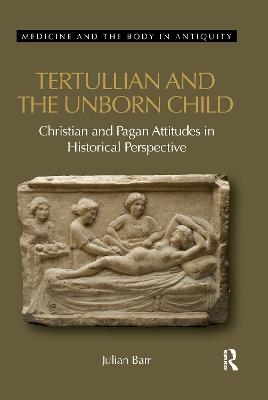
Tertullian and the Unborn Child
Christian and Pagan Attitudes in Historical Perspective
Seiten
2020
Routledge (Verlag)
978-0-367-59534-0 (ISBN)
Routledge (Verlag)
978-0-367-59534-0 (ISBN)
Tertullian of Carthage was the earliest Christian writer to argue vigorously against abortion. This book is the first comprehensive analysis of his attitude towards the foetus and embryo. It is argued that Tertullian's comments on the unborn should be read as rhetoric ancillary to his primary arguments, none of which related directly to abortion
Tertullian of Carthage was the earliest Christian writer to argue against abortion at length, and the first surviving Latin author to consider the unborn child in detail. This book is the first comprehensive analysis of Tertullian’s attitude towards the foetus and embryo. Examining Tertullian’s works in light of Roman literary and social history, Julian Barr proposes that Tertullian's comments on the unborn should be read as rhetoric ancillary to his primary arguments. Tertullian’s engagement in the art of rhetoric also explains his tendency towards self-contradiction. He argued that human existence began at conception in some treatises and not in others. Tertullian’s references to the unborn hence should not be plucked out of context, lest they be misread. Tertullian borrowed, modified, and discarded theories of ensoulment according to their usefulness for individual treatises. So long as a single work was internally consistent, Tertullian was satisfied. He elaborated upon previous Christian traditions and selectively borrowed from ancient embryological theory to prove specific theological and moral points. Tertullian was more influenced by Roman custom than he would perhaps have admitted, since the contrast between pagan and Christian attitudes on abortion was more rhetorical than real.
Tertullian of Carthage was the earliest Christian writer to argue against abortion at length, and the first surviving Latin author to consider the unborn child in detail. This book is the first comprehensive analysis of Tertullian’s attitude towards the foetus and embryo. Examining Tertullian’s works in light of Roman literary and social history, Julian Barr proposes that Tertullian's comments on the unborn should be read as rhetoric ancillary to his primary arguments. Tertullian’s engagement in the art of rhetoric also explains his tendency towards self-contradiction. He argued that human existence began at conception in some treatises and not in others. Tertullian’s references to the unborn hence should not be plucked out of context, lest they be misread. Tertullian borrowed, modified, and discarded theories of ensoulment according to their usefulness for individual treatises. So long as a single work was internally consistent, Tertullian was satisfied. He elaborated upon previous Christian traditions and selectively borrowed from ancient embryological theory to prove specific theological and moral points. Tertullian was more influenced by Roman custom than he would perhaps have admitted, since the contrast between pagan and Christian attitudes on abortion was more rhetorical than real.
Julian Barr is a research fellow at the University of Queensland, where he completed his PhD in classics. He tutors ancient history and classical languages. His research interests include early Christianity, ancient medicine, and the Roman family.
Preface
Introduction
Chapter 1: Rhetoric and the Unborn
Chapter 2: The Christian Context
Chapter 3: Tertullian’s Understanding of Prenatal Biology
Chapter 4: The Pagan Context
Conclusion
Bibliography
Index
| Erscheinungsdatum | 01.07.2020 |
|---|---|
| Reihe/Serie | Medicine and the Body in Antiquity |
| Verlagsort | London |
| Sprache | englisch |
| Maße | 156 x 234 mm |
| Gewicht | 453 g |
| Themenwelt | Geschichte ► Allgemeine Geschichte ► Vor- und Frühgeschichte |
| Geschichte ► Allgemeine Geschichte ► Altertum / Antike | |
| Geschichte ► Teilgebiete der Geschichte ► Kulturgeschichte | |
| Studium ► Querschnittsbereiche ► Geschichte / Ethik der Medizin | |
| Sozialwissenschaften ► Kommunikation / Medien ► Kommunikationswissenschaft | |
| ISBN-10 | 0-367-59534-6 / 0367595346 |
| ISBN-13 | 978-0-367-59534-0 / 9780367595340 |
| Zustand | Neuware |
| Informationen gemäß Produktsicherheitsverordnung (GPSR) | |
| Haben Sie eine Frage zum Produkt? |
Mehr entdecken
aus dem Bereich
aus dem Bereich
Konzepte – Methoden – Theorien
Buch | Softcover (2024)
UTB (Verlag)
39,90 €
meine Suche nach den Urzeit-Genen
Buch | Hardcover (2024)
DVA (Verlag)
26,00 €


